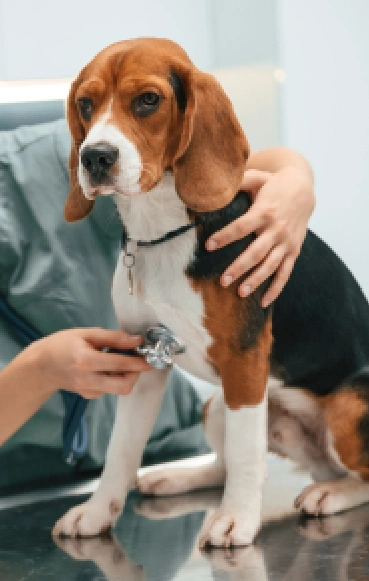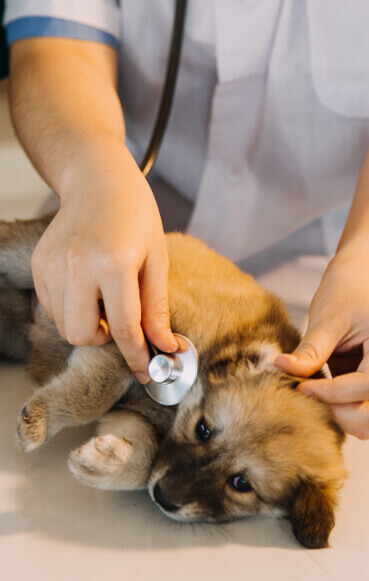Lymphoma is one of the most common cancers in cats, affecting various organs and tissues
such as the gastrointestinal tract, chest, kidneys, skin and lymph nodes. It is seen
more often in senior cats and those with Feline Leukaemia Virus (FeLV).
Despite being a serious disease, timely diagnosis and proper veterinary care can help
many cats respond well to treatment, allowing them to live longer and more comfortable
lives.
What Is Lymphoma in Cats?
Feline lymphoma is a type of cancer that develops when lymphocytes—white blood cells responsible for fighting infections and supporting the immune system—become abnormal. Instead of functioning normally, these cells multiply uncontrollably, leading to the formation of tumours. This uncontrolled growth disrupts the body’s natural defences and results in a cancer known as lymphoma.
Common Types of Lymphoma in Cats
Since the lymphatic system is linked to nearly every part of the body, lymphoma can develop in different regions. The main types of feline lymphoma include:
- Gastrointestinal Lymphoma: Also known as alimentary lymphoma, this is the most common type in cats. It affects the digestive tract, particularly the stomach, intestines and nearby lymph nodes.
- Mediastinal Lymphoma: This type occurs in the chest, often involving the thymus, lymph nodes and mediastinum. It is more commonly seen in Siamese cats.
- Multicentric Lymphoma: Multicentric lymphoma develops in multiple lymph nodes throughout the body at the same time.
- Renal Lymphoma: This form of lymphoma begins in the kidneys and can interfere with their normal function.
- Nasal Lymphoma: Nasal lymphoma originates in the nose and sinuses, causing symptoms such as sneezing, nasal discharge or breathing difficulties.
Common Causes and Risk Factors of Cat Lymphoma
There is no known cause for lymphoma in cats. However, several factors can contribute to its development. These risk factors include:
- Feline Leukaemia Virus (FeLV): Cats infected with FeLV are at higher risk of developing certain forms of lymphoma, especially mediastinal or multicentric types.
- Feline Immunodeficiency Virus (FIV): FIV infection compromises a cat's immune system, making their body less able to fight abnormal cell growth, including cancer.
- Genetic Predisposition: Some cat breeds have a higher risk of developing lymphoma, such as Siamese and Bengal cats.
- Environmental Factors: Exposure to tobacco smoke in the home makes cats significantly more likely to be diagnosed with the disease.
- Age: Older cats, especially those above 10 years, are more likely to develop lymphoma.
Signs and Symptoms of Lymphoma in Cats
The signs of lymphoma in cats can differ depending on the type and location of the cancer. However, some common symptoms to look out for include:
- Weight Loss: Unexplained or progressive weight loss is a frequent sign.
- Lethargy: Cats may appear unusually tired or less active.
- Vomiting and Diarrhoea: Digestive issues are common, especially with gastrointestinal lymphoma.
- Laboured breathing: Difficulty breathing may occur if the chest is affected.
- Enlarged Lymph Nodes or Abdominal Mass: These can sometimes be felt during examination or appear as swelling.
- Poor Appetite: Cats may eat less or stop eating altogether.
- Hiding Behaviour: Many cats withdraw and hide when they are unwell.
If you notice any of these signs in your cat, consult your vet clinic promptly for proper evaluation and care.
Treatment Options for Lymphoma
The treatment approach for feline lymphoma depends on the type and severity of the disease. Common options include:
- Chemotherapy: This is the primary treatment for lymphoma in cats. It involves using a combination of drugs to target and destroy cancer cells, often helping to extend survival and improve quality of life.
- Surgical Oncology: Cancer surgery for pets is less commonly used for lymphoma. However, it may be considered to diagnose the condition, remove localised tumours or address complications caused by the disease.
- Steroid Therapy: Steroids can temporarily reduce inflammation and shrink tumours. They may be recommended for cats that are unable to undergo chemotherapy due to age or other health concerns.
- Supportive Care: While not a direct cancer treatment, supportive measures such as pain management, appetite stimulants, and anti-nausea medications play a key role in keeping the cat comfortable.
There is no single best cure for feline lymphoma; treatment must be tailored to each cat’s type of lymphoma, overall health and response to therapy. A veterinary doctor can assess these factors and guide you toward the most suitable treatment approach for your cat.
How Long Can a Cat Live With Lymphoma?
The life expectancy of a cat with lymphoma depends on the type of lymphoma, how advanced it is at diagnosis and whether treatment is given. Cats that respond well to chemotherapy may live six months to two years, with some surviving even longer. Without treatment, most cats live only one to two months after diagnosis. Prognosis is also influenced by factors such as FeLV/FIV status, overall health and individual response to treatment, so outcomes can still vary even with therapy.
Supporting a Cat With Lymphoma at Home
As a cat owner, receiving a lymphoma diagnosis for your pet can feel overwhelming, but with the right care, you can make a meaningful difference in their comfort and treatment journey. Here are some important ways to support your cat:
- Creating a Calm Environment: Cats with lymphoma benefit from a quiet, stress-free space where they can rest undisturbed. Minimise loud noises and limit interactions with other pets that may cause anxiety.
- Monitoring for Changes: Keep a close eye on your cat for potential side effects of chemotherapy or other treatments. Symptoms such as sudden weight loss, vomiting, diarrhoea, loss of appetite, breathing difficulty or unusual behaviour should be reported to your vet immediately.
- Nutritional Support and Hydration: Since appetite and digestion may be affected, offer highly palatable, easily digestible, high-quality food and ensure your cat has access to fresh water at all times.
- Regular Veterinary Check-ups: Routine visits are essential for monitoring your cat’s response to treatment. These appointments allow the vet to adjust medications as needed and detect early signs of complications or relapse.
While lymphoma is a serious disease, timely treatment and ongoing support at home can
greatly improve your cat’s quality of life. Work closely with your vet to ensure your
cat gets the best possible care.
If your cat is showing signs, seek veterinary care immediately. Timely action and expert
treatment can make all the difference. Contact us today to schedule a consultation with
our veterinary doctor.
Frequently Asked Questions
Will my cat experience pain during or after treatment?
Most cats do not experience pain during or after treatment, as veterinarians focus on keeping them as comfortable as possible throughout the process. However, discomfort may occur if the tumour becomes large enough to press on nearby organs, nerves or bones.
How much does lymphoma treatment for cats cost?
The cost of treatment varies depending on the type of lymphoma and the treatment plan chosen. Your veterinarian can provide a personalised estimate after evaluating your cat’s condition and discussing the most appropriate options.
What quality of life can my cat expect during treatment?
Many cats tolerate lymphoma treatment well and continue to enjoy a good quality of life. They often maintain their appetite, playfulness and bond with their families while receiving care.

Bedok (24 Hrs Vet Clinic)
26 Jln Pari Burong, Picardy Gardens, Singapore 488692 (Shophouse along Upper Changi Road)
Operating Hours: 24 Hours Daily
Balestier (Vet Clinic)
564A Balestier Road, Singapore 329880
Opening Hours: 9am - 9pm Daily Closed on Tuesday & Public Holidays







